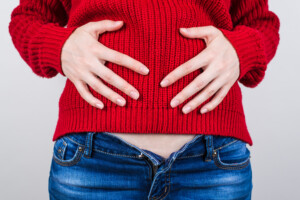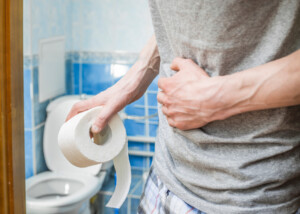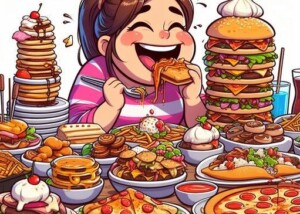
There are many causes of bloating after meals or eating, but you need not suffer with this uncomfortable situation.
To avoid bloating after eating, here are steps to take.
First off, make sure that you notice the bloating only after eating, rather than during times when food can’t possibly be a cause.
There are many medical conditions that cause either a sensation of bloating or actual bloating (e.g., fluid buildup in the abdomen).
But many people feel bloating that is directly related to eating.
“Everyone has different foods that their body may not tolerate well,” says Walter Gaman, MD, FABFM, board certified in family medicine and the author of several award-winning books including “Age to Perfection: How to Thrive to 100, Happy, Healthy, and Wise.”
“Get to know your body and avoid foods that cause distress or bloating.
“For some, this may be dairy, even lactose-free dairy, because of the proteins in the dairy products.
“Others may have issues with vegetables like onions, cabbage or broccoli.”
More Ways to Avoid Bloating After Eating
Avoid carbonated beverages. The carbonation will give you a gassy bloated feeling, even if you sip slowly.
Replace with the best drink you can have with meals: water. This may not seem exciting, but a glass of very chilled water will soon become quite appealing with food.

Freepik.com
Avoid gulping air while eating and drinking. This causes gas in the abdomen.
Avoid talking while chewing. Not only can this cause gas buildup in your stomach, but it’s very unsightly to anyone who’s eating with you.
No conversation is so important that you can’t wait till all the food in your mouth is swallowed before you begin speaking.
Watch per-meal fiber intake. A diet high in fiber is healthy for the gut, but make sure not to cram a lot of your daily fiber quota into one meal. Try to spread it out throughout the day.
Keep a food diary. See if maybe there’s a particular food that you have often that might be making you feel bloated after eating it.
This could signal a food intolerance or allergy. Remove any suspected foods from your diet and see what happens.
Do this one food at a time to accurately keep track. Prime culprits are gluten-containing foods.
Restrict fattening foods. Go easy on the butter and gravy. Cut back or avoid anything with saturated fats.
Exercise after your meal. No, not an all-out gym fest, but do yoga, walking or a neighborhood bike ride for 30 minutes.

Freepik.com/yanalya
Heartburn treatment. If you’ve been diagnosed with heartburn, make sure that ongoing treatment is underway.
Acid reflux can contribute to a feeling of bloating after meals. Keep in mind that acid reflux, if caused by chronic anxiety, can be treated by learning how to manage your stress levels.
Dr. Gaman also advises, “Remember that not all bloating and gas come from beans. A good tip for reducing bloating is to drink some freshly squeezed lemon juice with your meals.” Sweeten it with Stevia, a natural zero-calorie sweetener.

Dr. Gaman is with Executive Medicine of Texas and is with the Staying Young Radio Show 2.0 podcast.
 Lorra Garrick has been covering medical, fitness and cybersecurity topics for many years, having written thousands of articles for print magazines and websites, including as a ghostwriter. She’s also a former ACE-certified personal trainer.
Lorra Garrick has been covering medical, fitness and cybersecurity topics for many years, having written thousands of articles for print magazines and websites, including as a ghostwriter. She’s also a former ACE-certified personal trainer.
.


























